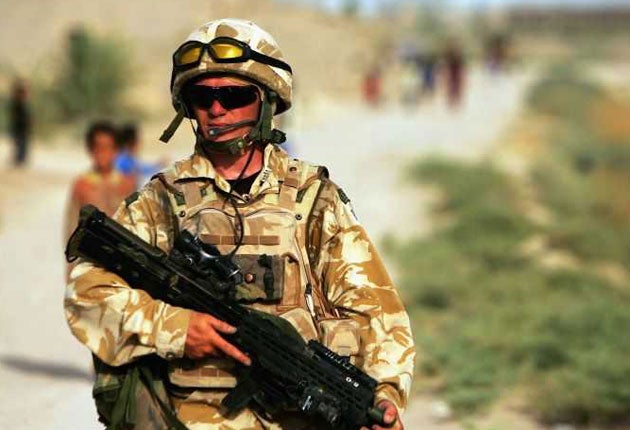British troops 'will leave Iraq within a year'
Withdrawal does not mean boost for Afghanistan, defence source reveals

Your support helps us to tell the story
From reproductive rights to climate change to Big Tech, The Independent is on the ground when the story is developing. Whether it's investigating the financials of Elon Musk's pro-Trump PAC or producing our latest documentary, 'The A Word', which shines a light on the American women fighting for reproductive rights, we know how important it is to parse out the facts from the messaging.
At such a critical moment in US history, we need reporters on the ground. Your donation allows us to keep sending journalists to speak to both sides of the story.
The Independent is trusted by Americans across the entire political spectrum. And unlike many other quality news outlets, we choose not to lock Americans out of our reporting and analysis with paywalls. We believe quality journalism should be available to everyone, paid for by those who can afford it.
Your support makes all the difference.Britain's war in Iraq will end by this time next year, a highly placed defence source said yesterday. But asked whether the pullout from Iraq would mean reinforcements being sent to combat a resurgent Taliban, the senior officer responded: "Emphatically no. We have already mortgaged the Iraq dividend by boosting our force in Afghanistan to 8,000. That is the limit."
Gordon Brown said two months ago there would be a "fundamental change of mission" in Iraq in 2009. Almost all the 4,100 troops will be out by autumn next year. A few hundred will remain to train Iraqi forces.
The effective end to British involvement in the conflict, with the loss so far of 176 service personnel, is possible because of a dramatic improvement in the security situation. Until recently the UK force faced more than a dozen rocket and mortar attacks a day in Basra. This has dwindled to "low to zero".
The supply of weapons and explosives from across the Iranian border has been significantly by British and Iraqi military operations and because, said the officer, "Iran does not want an unstable Iraq in the medium term". He added that the Iranians feel it would be a waste to risk men and materials on the British who are in the process of leaving.
US forces arrived in Basra at the beginning of 2008 to join Iraqi troops fighting Muqtada al-Sadr's Mahdi Army. American commanders will reinforce their presence in southern Iraq to protect supply routes as the British leave. However, the security situation is unravelling in Afghanistan, with the last three months producing rising numbers of casualties for Western forces. Brigadier Mark Carleton-Smith, the British commander in the country, said the size of the force in Helmand needed to rise by 50 per cent.
"More soldiers would stabilise areas here that remain dangerous more quickly," he said. "We could easily consume another brigade in Helmand."
UK defence chiefs are adamant, however, that that the overstretch of forces, does not allow more troops to be sent to Afghanistan.
Join our commenting forum
Join thought-provoking conversations, follow other Independent readers and see their replies
Comments